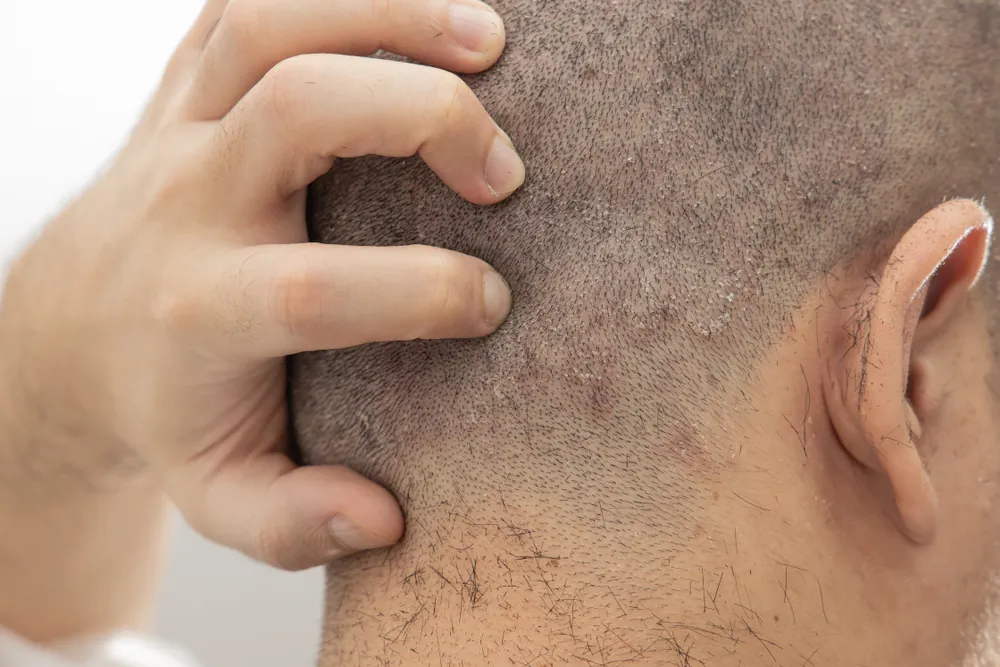If you’ve been searching for natural remedies for itchy scalp and hair loss, you’ve come to the right place. Itchy scalp and hair shedding can be frustrating and embarrassing, but the good news is that many natural, safe options can help soothe scalp irritation, reduce itchiness, and promote healthy hair growth. Whether your itchy scalp is due to dryness, dandruff, or an underlying condition, and your hair loss is mild or more extensive, this guide will walk you through effective treatments you can try at home.
In this comprehensive article, you’ll learn about the causes of itchy scalp and hair loss, discover a range of herbal, dietary, and lifestyle solutions, and find practical tips to keep your scalp balanced and your hair strong—all naturally.
Understanding the Causes of Itchy Scalp and Hair Loss
Before diving into remedies, it’s important to understand what might cause your scalp to itch and hair to fall out.
Common Causes of Itchy Scalp:
- Dandruff (seborrheic dermatitis): Overgrowth of yeast on the scalp causing flaking and itching.
- Dry scalp: Lack of moisture leads to tight, itchy skin.
- Allergic reactions: Sensitivity to shampoos, dyes, or styling products.
- Psoriasis or eczema: Skin conditions causing inflammation and irritation.
- Head lice or infections: Parasitic infestations or fungal infections.
- Stress or hormonal imbalances: Can affect scalp health indirectly.
Causes of Hair Loss:
- Telogen effluvium: Stress or trauma causing excessive hair shedding.
- Androgenetic alopecia: Genetic pattern baldness.
- Scalp inflammation: Conditions causing itch and follicle damage can promote hair loss.
- Nutritional deficiencies: Lack of iron, zinc, or vitamins.
- Excessive styling or chemical use: Physical or chemical damage to hair shafts and follicles.
Natural Remedies for Itchy Scalp and Hair Loss: What Really Works?
1. Apple Cider Vinegar: Balancing pH & Fighting Microbes
Apple cider vinegar (ACV) is a popular natural remedy with antibacterial, antifungal, and anti-inflammatory properties. It helps balance the scalp’s pH, reducing itchiness and fighting fungal infections linked to dandruff.
How to use:
- Dilute ACV with equal parts water.
- Apply to your scalp using a cotton ball or spray bottle, avoiding open wounds.
- Leave on for 10-15 minutes, then rinse with lukewarm water.
- Use 2-3 times a week.
2. Coconut Oil: Moisturizing and Anti-Microbial Power
Coconut oil is rich in lauric acid, which penetrates the hair shaft, moisturizing both scalp and hair while exhibiting antibacterial and antifungal effects.
Usage tips:
- Warm a small amount of virgin coconut oil and massage gently onto your scalp.
- Leave on for at least 30 minutes or overnight for deeper hydration.
- Wash out with a mild shampoo.
- Repeat 2-3 times a week.
3. Aloe Vera: Calming Inflammation and Hydrating
Known for its soothing properties, aloe vera gel reduces inflammation, relieves itchiness, and moisturizes dry scalps.
How to apply:
- Use 100% pure aloe vera gel and massage onto the scalp.
- Leave on for 30-60 minutes, then rinse with lukewarm water.
- Use regularly to maintain scalp health.
4. Tea Tree Oil: Natural Antiseptic and Anti-Fungal
Tea tree oil is found in many medicated shampoos due to its ability to fight dandruff-causing fungi and reduce scalp inflammation.
Using tea tree oil safely:
- Mix 2-3 drops of tea tree oil with 1 tablespoon of carrier oil (like coconut or jojoba oil).
- Massage the blend into the scalp and leave for 15-30 minutes.
- Wash with mild shampoo to avoid residue.
- Use once or twice weekly.
5. Peppermint and Lavender Oils: Cooling and Healing Effects
Peppermint oil’s menthol creates a cooling sensation that reduces itch, while lavender oil helps soothe inflammation and promotes relaxation. Both oils may stimulate scalp circulation, supporting hair growth.
Application:
- Dilute a few drops in carrier oil and massage into scalp.
- Leave on for 20-30 minutes before washing.
6. Onion Juice: Stimulating Hair Growth and Combating Inflammation
Onion juice contains sulfur compounds that promote collagen production and improve blood flow to hair follicles, encouraging hair regrowth.
Method:
- Extract juice from a fresh onion and apply to the scalp.
- Leave for 30-60 minutes, then rinse with mild shampoo.
- Use twice weekly as tolerated.
7. Neem: Antimicrobial and Scalp Health Booster
Neem has been used medicinally for centuries. It combats fungi and bacteria, reduces scalp inflammation, and can relieve itch associated with dandruff.
Use:
- Prepare neem leaf water or use neem oil diluted in a carrier oil.
- Apply to scalp once or twice per week.
Diet and Lifestyle Tips to Support Scalp and Hair Health Naturally

Maintain a Balanced Diet Rich in Scalp-Nourishing Nutrients
Eating well supports hair growth and scalp health.
- Include protein-rich foods: lean meats, eggs, legumes.
- Eat omega-3 fatty acids found in fish, flaxseeds, and walnuts—essential for skin and follicle health.
- Ensure adequate intake of zinc, iron, vitamin D, and B vitamins.
- Stay hydrated for optimal scalp moisture.
Manage Stress and Get Quality Sleep
Stress prompts inflammatory responses causing scalp irritation and hair shedding. Practice relaxation techniques such as meditation, yoga, or deep breathing. Aim for 7-9 hours of restful sleep nightly to facilitate body repair.
Practical Step-by-Step Routine for Soothing Itchy Scalp and Promoting Hair Growth
Morning: Gently massage scalp with diluted peppermint oil or apply aloe vera gel for calming effects. Fuel your day with a balanced breakfast rich in protein and healthy fats.
Weekly: Apply a coconut oil or neem oil treatment in the evening. Let sit overnight and wash out the next morning.
Twice weekly: Use diluted apple cider vinegar rinse post-shampoo to rebalance scalp pH and fight dandruff.
During shower: Use a gentle shampoo containing tea tree oil or natural ingredients suited for sensitive scalps.
Daily: Maintain hydrated scalp with light jojoba or argan oil if needed.
When to See a Dermatologist or Hair Specialist
If your itchy scalp persists despite trying these natural remedies or you notice severe hair thinning, scalp sores, or excessive shedding, it’s important to consult a healthcare provider. Underlying medical conditions like psoriasis, eczema, or alopecia might require targeted treatment.
Understanding Scalp Microbiome and Its Role in Itchy Scalp and Hair Loss
The scalp microbiome—the communities of bacteria, fungi, and other microorganisms living on your scalp—plays a crucial role in maintaining scalp health. An imbalance in these microbes can lead to inflammation, itchiness, and even contribute to hair thinning.
How Microbial Imbalance Triggers Itchy Scalp and Hair Loss
- Overgrowth of Malassezia yeast is frequently linked to dandruff and seborrheic dermatitis, both causing itching and scaling.
- Pathogenic bacteria can cause folliculitis, an inflammation of hair follicles leading to hair fall.
- Disrupted microbiomes may impair the scalp’s natural defense mechanisms, increasing susceptibility to irritation and infection.
Nurturing a Healthy Scalp Microbiome Naturally
- Use gentle, sulfate-free shampoos that preserve the beneficial microbes.
- Incorporate natural antimicrobials like tea tree or neem oil carefully to rebalance microbial populations.
- Avoid over-washing, which can strip oils and microbiome balance.
- Consider scalp exfoliation using mild scrubs or brush massages to remove dead skin and encourage healthy turnover.
Herbal Infusions and Rinses for Scalp Rejuvenation

Herbal rinses have been used traditionally to soothe the scalp and support hair strength. These natural infusions deliver antioxidants, vitamins, and anti-inflammatory compounds.
Popular Herbal Rinses and Their Benefits
- Chamomile: Calms sensitive and inflamed scalp, reduces itchiness.
- Rosemary: Enhances circulation, stimulates hair follicles for growth and thickness.
- Hibiscus: Rich in amino acids, supports collagen synthesis and hair strength.
- Peppermint: Refreshes scalp and improves blood flow to follicles.
How to Use Herbal Rinses
- Brew fresh or dried herbs in boiling water, steep 15-20 minutes, and cool.
- Strain and use as a final rinse after shampooing.
- Customize blends based on scalp needs (e.g., chamomile for dryness, rosemary for thinning hair).
Regular use promotes a balanced, healthy scalp environment conducive to reducing itch and hair loss.
The Role of Scalp Massage in Combating Itchiness and Promoting Hair Growth
Scalp massage increases blood circulation, helping deliver essential nutrients to hair follicles and providing a natural itch-relief mechanism by stimulating nerve endings.
Benefits of Regular Scalp Massage
- Improves oxygenation and nutrient supply to hair roots.
- Encourages relaxation and reduces stress-related scalp tension.
- Helps distribute natural oils across the scalp, reducing dryness and flaking.
How to Practice Scalp Massage at Home
- Use your fingertips (not nails) to apply gentle pressure in small circular motions.
- Incorporate oils like jojoba, almond, or castor oil for added nourishment.
- Massage for 5-10 minutes daily or several times a week, ideally before washing.
This simple routine supports scalp health holistically and can enhance the effect of other natural remedies.
Nutritional Strategies and Supplements for Hair and Scalp Health

Proper nutrition is foundational for resolving scalp issues and preventing hair loss.
Essential Nutrients for Strong Hair and Healthy Scalp
- Biotin (Vitamin B7): Supports keratin production, essential for hair structure.
- Zinc: Regulates oil gland function, plays a role in hair follicle repair.
- Iron: Prevents anemia-related hair thinning and scalp dryness.
- Vitamin D: Influences hair follicle cycling and immune modulation.
- Omega-3 fatty acids: Reduce inflammation and hydrate scalp tissues.
When and How to Use Supplements
- Obtain nutrients primarily through a balanced diet rich in leafy greens, nuts, seeds, fish, and lean meats.
- Use supplements under medical supervision, especially if hair loss or scalp issues are severe or persistent.
Combining topical natural treatments with internal nutritional support maximizes healing and hair regeneration.
Environmental Factors Affecting Scalp Health and How to Mitigate Them
External elements like pollution, harsh weather, and UV exposure can aggravate itchiness and damage hair follicles.
Common Environmental Triggers
- Dirt and pollutants clogging follicles, leading to irritation and infection.
- Sun exposure causing scalp dryness, sunburn, and weakening hair shafts.
- Extreme cold or heat influencing skin moisture balance.
Protective Measures
- Regular gentle cleansing to remove pollutants without stripping oils.
- Wearing hats or using scalp-friendly sun protection sprays outdoors.
- Using humidifiers in dry climates to maintain scalp moisture.
Addressing environmental factors helps maintain a balanced scalp ecosystem and reduce conditions that foster itch and hair loss.
Conclusion: Effective Natural Remedies for Itchy Scalp and Hair Loss
Finding natural remedies for itchy scalp and hair loss empowers you to soothe irritation and support hair health without harsh chemicals. Remedies like apple cider vinegar, coconut oil, aloe vera, tea tree oil, and dietary improvements address the root causes of scalp imbalance and hair shedding.
